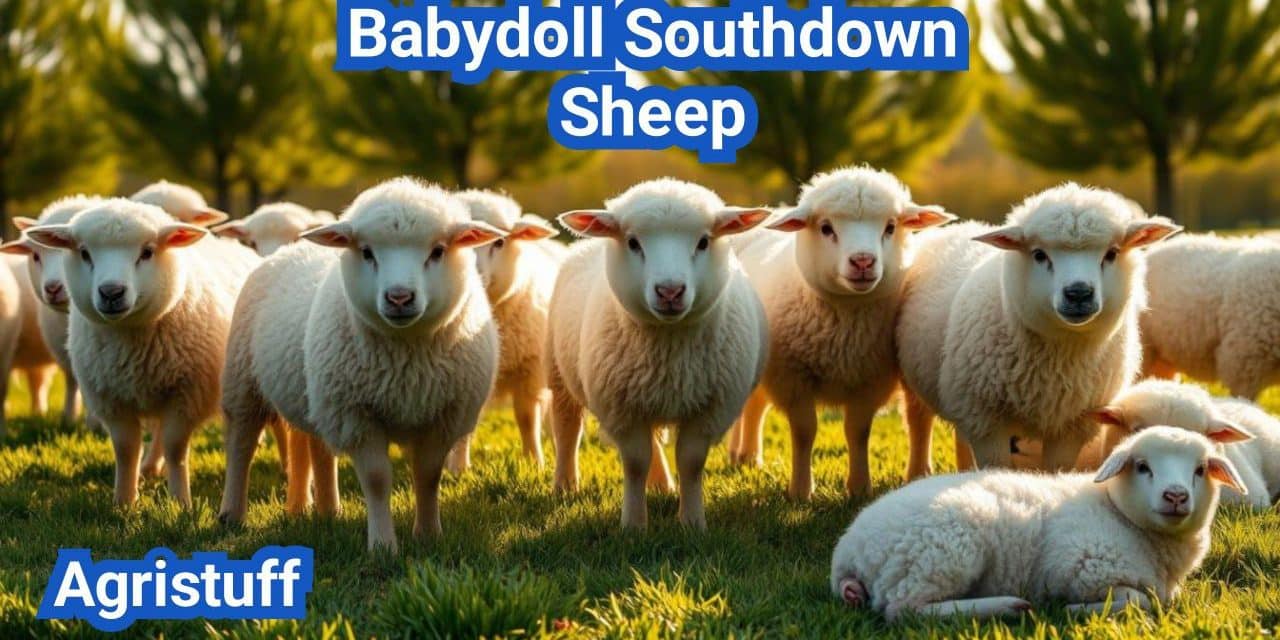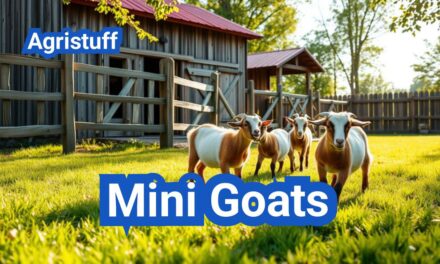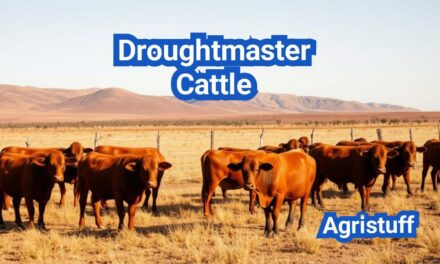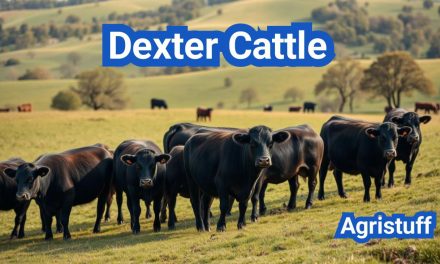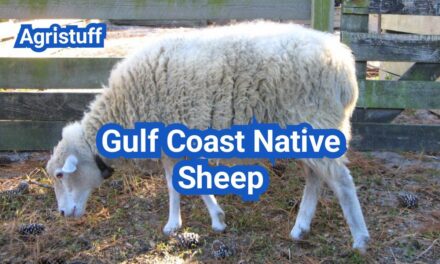The Babydoll Southdown Sheep is a heritage breed known for its compact size and gentle nature, making it a favorite among small farm owners and animal enthusiasts. With their cashmere-like fleece and endearing teddy bear faces, these miniature sheep are as charming as they are useful.
Originating from the Southdown breed, Babydoll Southdown Sheep have been bred to retain their small stature while maintaining the characteristics that make them valuable for their fleece and friendly disposition. They are ideal for small farms due to their manageable size and low maintenance requirements.
Key Takeaways
- Compact size makes them suitable for small farms.
- Known for their gentle and friendly nature.
- Cashmere-like fleece is highly valued.
- Low maintenance requirements.
- Ideal for those looking for pets or lawnmowers.
The History and Origin of Babydoll Southdown Sheep
With roots tracing back to the South Downs of Sussex County, England, the Babydoll sheep are a heritage breed known for their small stature and significant historical background. Officially recognized as Babydoll Southdown sheep, they are the diminutive version of the Southdown breed, which has a rich history dating back centuries.
One of the Oldest English Breeds
The Babydoll Southdown sheep are part of one of the oldest English sheep breeds, originating from the South Downs region. This breed has been cherished for its unique characteristics and has played a significant role in agricultural history. The Olde English Babydoll Southdown Sheep are particularly valued for their heritage and historical significance.
Their history is deeply intertwined with the agricultural practices of England, where they were bred for their wool, milk, and meat. Over time, they have become an integral part of the country’s cultural heritage, symbolizing traditional farming practices.
From England to America: The Journey of Babydoll Sheep
The journey of Babydoll Southdown sheep from England to America marks a significant chapter in their history. As settlers traveled to the New World, they brought with them their agricultural practices and livestock, including the Southdown sheep. The breed adapted well to the American landscape, and over time, it evolved into the Babydoll Southdown sheep we know today.
The heritage sheep breeds like the Babydoll Southdown have found a new home in America, where they are appreciated for their historical significance and their contribution to sustainable farming practices. Today, they are recognized as a valuable part of agricultural heritage, both in England and America.
Physical Characteristics of Babydoll Southdown Sheep
Babydoll Southdown Sheep are known for their compact size and charming appearance. These sheep are a delight to behold, with their short stature and fluffy coats making them a popular choice among sheep enthusiasts.
Size and Weight Expectations
Babydoll Southdown Sheep are characterized by their small size. They typically stand between 18 to 24 inches tall when fully grown. Their weight ranges from 60 to 125 pounds, making them an ideal choice for small homesteads or farms with limited space.
Key size and weight characteristics include:
- Height: 18-24 inches
- Weight: 60-125 pounds
Distinctive Appearance Features
Babydoll Southdown Sheep have a distinctive appearance that sets them apart from other breeds. Their fluffy coats and endearing faces make them a joy to be around. They have a robust build despite their small size, which adds to their charm.
Color Varieties: White, Black, and Spotted
Southdown Sheep come in a variety of colors, including white, black, and spotted. This range of colors adds to their visual appeal and makes them a versatile choice for different farming or landscaping needs.
The different color varieties are:
- White
- Black
- Spotted
The variety in color, combined with their compact size and charming appearance, makes Babydoll Southdown Sheep a unique and attractive breed for many farmers and hobbyists.
Why Choose Babydoll Southdown Sheep for Your Farm

Babydoll Southdown Sheep are gaining popularity among hobby farmers due to their manageable size and multi-purpose uses. These sheep offer a unique combination of characteristics that make them an excellent choice for small farms and homesteads.
Perfect Size for Small Homesteads
The compact size of Babydoll Southdown Sheep is one of their most significant advantages for small farm owners. They require less space compared to larger breeds, making them ideal for properties with limited acreage. Here are some benefits of their size:
- Less Space Required: They need less room to graze and roam, making them perfect for small homesteads.
- Easier Handling: Their smaller size makes them easier to handle, especially for beginners or those with limited physical strength.
- Lower Feed Costs: They consume less feed, which can significantly reduce the overall cost of maintaining your farm.
Versatility and Multiple Uses
Babydoll Southdown Sheep are not just cute additions to your farm; they are also incredibly versatile. They can be used for various purposes, including:
- Lawn Maintenance: They are effective at controlling grass and weeds, reducing the need for lawn mowing and herbicides.
- Wool Production: Their fleece is soft and of high quality, making it suitable for spinning, knitting, or selling.
- Companionship: Babydoll Southdown Sheep are friendly and can make great pets, providing companionship for both humans and other animals on the farm.
By incorporating Babydoll Southdown Sheep into your small farm or homestead, you can enjoy the benefits of a multi-functional and sustainable agricultural operation.
Temperament and Behavior of Babydoll Sheep
Babydoll Sheep exhibit a remarkable temperament, characterized by their friendly and outgoing nature, which makes them highly sociable animals. Their calm demeanor is one of the reasons they are preferred by many farmers and homestead owners.
Personality Traits and Social Behavior
Babydoll Southdown Sheep are known for their gentle disposition and affectionate nature. They thrive in the company of other sheep and are often described as having a strong social bond within their groups. This social behavior is a key aspect of their temperament, making them a joy to be around.
Their friendly nature also makes them an excellent choice for farms that have other animals. They tend to get along well with other docile breeds, creating a harmonious environment.
Interaction with Other Animals and Humans
One of the standout features of Southdown Sheep is their ability to interact positively with both other animals and humans. Their calm nature means they are less likely to be aggressive, making them suitable for farms with a variety of livestock.
Farmers and handlers often comment on how easily these sheep can be managed due to their friendly and cooperative nature. This trait is particularly beneficial for smaller farms or homesteads where the sheep may be handled regularly.
In summary, the temperament and behavior of Babydoll Southdown Sheep make them an ideal choice for many farming operations. Their social, friendly, and docile nature ensures they can be a valuable and pleasant addition to any farm or homestead.
Setting Up Your Farm for Babydoll Southdown Sheep

Creating a suitable environment for Babydoll Southdown Sheep involves understanding their space, shelter, and fencing requirements. To ensure the health and well-being of these charming animals, it’s essential to provide them with the right conditions.
Space Requirements: How Many Sheep Per Acre
Babydoll Southdown Sheep are known for their compact size, making them ideal for small farms or homesteads. Generally, you can keep 4 to 6 Babydoll Southdown Sheep per acre, depending on the quality of the pasture and the availability of supplementary feed.
The space requirements for Babydoll Southdown Sheep are relatively modest. They need enough room to graze and exercise. Here are some key considerations:
- Ensure adequate grazing area to prevent overgrazing.
- Provide enough space for the sheep to move around comfortably.
- Consider rotational grazing to maintain pasture health.
Shelter Needs and Recommendations
Adequate shelter is crucial for protecting Babydoll Southdown Sheep from extreme weather conditions and predators. The shelter should be:
- Well-ventilated to prevent respiratory issues.
- Dry to keep the sheep comfortable.
- Secure to protect against predators.
When planning the shelter, consider the following:
- Use sturdy materials for construction.
- Ensure the shelter is easy to clean and maintain.
- Provide enough bedding, such as straw, to keep the sheep dry and comfortable.
Proper Fencing for Babydoll Sheep
Fencing is a critical aspect of setting up a farm for Babydoll Sheep. The fence should be at least 4 feet high to prevent escape and protect against predators. Here are some fencing recommendations:
- Use woven wire fencing or electric fencing for effective containment.
- Ensure the fencing is sturdy and well-maintained.
- Consider adding a barrier at the bottom of the fence to prevent predators from getting under.
By understanding and implementing the right space, shelter, and fencing requirements, you can create a thriving environment for your Babydoll Southdown Sheep.
Feeding and Nutrition for Babydoll Southdown Sheep
Nutrition plays a significant role in the health and productivity of Babydoll Southdown Sheep. Ensuring these sheep receive a balanced diet is crucial for their overall well-being and for maintaining their characteristic charm and productivity.
Daily Dietary Requirements
Babydoll Southdown Sheep are considered easy keepers, meaning they thrive on good quality grass and hay. Their daily dietary requirements include a mix of high-quality forage. It’s essential to provide them with a diet rich in nutrients to support their health.
Nutritional Needs:
- High-quality grass and hay as the main staple
- Adequate access to clean water
- Mineral supplements as necessary
| Nutrient | Requirement |
|---|---|
| Crude Protein | At least 10% |
| Crude Fiber | 25-30% |
| Minerals | Calcium, Phosphorus, and Salt |
Seasonal Feeding Adjustments
Seasonal changes can affect the nutritional needs of Babydoll Southdown Sheep. For instance, during winter, they may require more hay to compensate for the lack of grazing. In contrast, during lush spring months, they may need less supplemental feeding.
Seasonal Considerations:
- Winter: Increase hay and consider additional supplements
- Spring: Monitor grazing to avoid overgrazing
- Summer: Ensure adequate water and shade
- Autumn: Gradually adjust to winter feeding regimen
By understanding and adjusting to these seasonal needs, you can ensure your Babydoll Southdown Sheep remain healthy and thrive throughout the year.
Health Care and Maintenance

Maintaining the health of your Babydoll Southdown Sheep is crucial for their overall well-being and productivity. Regular monitoring and preventive care can significantly reduce the risk of diseases and ensure a thriving flock.
Common Health Issues and Prevention
Babydoll Southdown Sheep are generally hardy, but like all livestock, they can be susceptible to certain health issues. Common problems include internal parasites, foot rot, and respiratory infections. Regular health checks are vital to catch any issues early. Implementing a parasite control program and maintaining clean living conditions can help prevent many of these issues.
- Monitor for signs of illness or stress
- Keep living areas clean and dry
- Implement a regular vaccination program
Vaccination Schedule
Developing a vaccination schedule with your veterinarian is crucial for protecting your Babydoll Southdown Sheep against diseases such as Clostridium perfringens and tetanus. The schedule should be tailored to the specific needs of your flock, considering factors like age, health status, and local disease risks.
- Consult with a veterinarian to develop a customized vaccination plan
- Keep accurate records of vaccinations and health checks
- Adjust the vaccination schedule as necessary based on the health status of your flock
Hoof Care and Grooming
Regular hoof care is essential for the health and comfort of your Babydoll Southdown Sheep. Hoof trimming should be performed every 6-8 weeks, or as needed, to prevent overgrowth and related issues like lameness. Additionally, regular grooming helps to detect any health issues early and strengthens the bond between you and your sheep.
By focusing on these aspects of health care and maintenance, you can ensure your Southdown Sheep remain healthy and thrive.
Harvesting and Using Babydoll Southdown Sheep Fleece

The Babydoll Southdown sheep is renowned for its soft, cashmere-like fleece, making it a valuable asset for farmers and fiber enthusiasts alike. This unique characteristic not only adds to the sheep’s appeal but also provides a potential source of income through the sale of their wool.
The Cashmere-Like Quality of Babydoll Wool
Babydoll Southdown sheep produce a fleece that is exceptionally soft and warm, often compared to cashmere. This cashmere-like quality is due to the fine fibers that make up their wool, which are highly prized by fiber artists and crafters. The fleece is not only a delight to touch but also highly versatile, suitable for a variety of textile applications.
Shearing Techniques and Timing
Shearing is a critical aspect of harvesting Babydoll sheep fleece. It is essential to use proper shearing techniques to ensure the wool is collected in the best possible condition. The timing of shearing is also crucial, typically done once or twice a year, depending on the climate and the sheep’s individual needs.
The process involves carefully preparing the sheep, using clean and sharp shearing tools, and handling the fleece gently to avoid damage. This attention to detail helps maintain the quality of the wool, making it more valuable to potential buyers.
Processing and Selling Babydoll Wool
After shearing, the fleece needs to be processed to prepare it for sale. This involves cleaning, carding, and sometimes spinning the wool into yarn. Processing the fleece correctly is vital to bring out its natural qualities and make it appealing to fiber artists and crafters.
Selling Babydoll wool can be done through various channels, including local craft fairs, online marketplaces, and directly to textile manufacturers. Understanding the market demand and pricing is key to successfully selling the wool and generating a profit.
By focusing on the quality of the fleece, employing proper shearing and processing techniques, and targeting the right market, farmers can capitalize on the unique characteristics of Babydoll Southdown sheep fleece, turning it into a valuable product.
Babydoll Southdown Sheep as Organic Weeders

The use of Babydoll Southdown Sheep as organic weeders presents a unique opportunity for farmers to adopt eco-friendly practices. Their small size and gentle grazing nature make them an ideal choice for weed control in sensitive environments.
Benefits in Orchards and Vineyards
Babydoll Southdown Sheep offer several benefits when used in orchards and vineyards. Their grazing helps to control weeds, reducing the need for herbicides and mechanical weed control methods. This not only promotes a healthier ecosystem but also reduces the environmental impact of farming operations.
- Reduced Chemical Use: By using sheep to graze, farmers can significantly reduce their reliance on chemical herbicides.
- Improved Soil Health: The sheep’s grazing helps to maintain a balanced ecosystem, promoting soil health through the natural cycle of grazing and manure deposition.
- Increased Biodiversity: Integrating sheep into farming systems can increase biodiversity by creating a more complex and dynamic ecosystem.
Implementation and Management
Successfully integrating Babydoll Southdown Sheep into orchard or vineyard management requires careful planning and execution. Farmers must consider factors such as the size of the area to be grazed, the number of sheep required, and the fencing needed to protect both the sheep and the crops.
- Assess the Land: Evaluate the area to determine the appropriate number of sheep and the necessary infrastructure.
- Fencing and Shelter: Ensure that adequate fencing is in place to contain the sheep and protect the crops. Provide appropriate shelter for the sheep.
- Monitoring and Adjustment: Regularly monitor the grazing impact and adjust the number of sheep or the grazing duration as needed to maintain a balance.
By adopting Babydoll Southdown Sheep as organic weeders, farmers can not only reduce their environmental footprint but also potentially generate additional income through the sale of sheep or their by-products, such as wool.
Breeding Babydoll Southdown Sheep

For farmers interested in breeding Southdown Sheep, knowledge of the breeding season and gestation period is crucial. Breeding Babydoll Southdown Sheep requires careful planning and a thorough understanding of their reproductive cycle.
Breeding Season and Gestation
The breeding season for Babydoll Southdown Sheep typically occurs in the fall, allowing for spring lambing. The gestation period for these sheep is approximately 150 days. Understanding the breeding season and gestation is vital for managing the reproductive health of the ewes.
Lambing Process and Newborn Care
The lambing process is a critical period that requires close monitoring to ensure the health and safety of both the ewe and the lambs. Newborn lambs need immediate care, including colostrum intake and umbilical cord care. Proper newborn care is essential for the survival and thriving of the lambs.
Genetic Considerations for Breeding
Genetic considerations play a significant role in breeding Babydoll Southdown Sheep. Breeders must consider factors such as genetic diversity, desirable traits, and the potential for inherited health issues. Responsible breeding practices are crucial for maintaining the health and integrity of the breed.
By carefully managing the breeding season, gestation, lambing process, and newborn care, and by considering genetic factors, breeders can successfully breed Babydoll Southdown Sheep. This not only ensures the well-being of the animals but also contributes to the sustainability of the breeding program.
Registration and Grading Requirements

Understanding the registration and grading requirements is essential for any Babydoll Southdown Sheep breeder. The process ensures that the breed maintains its integrity and that breeders can verify the purity and quality of their sheep.
Babydoll Southdown Sheep Breeders Association Standards
The Babydoll Southdown Sheep Breeders Association (BSSBA) is the governing body that oversees the registration of Babydoll Southdown Sheep. The BSSBA has established strict standards for the registration process, which includes verifying the sheep’s lineage, size, and other breed characteristics. To register, breeders must provide detailed information about their sheep, including pedigree records and physical descriptions.
Understanding Grades and Classifications
The BSSBA also maintains a grading system that classifies registered sheep based on their adherence to breed standards. The grading process involves evaluating the sheep’s physical attributes, such as coat color, size, and conformation. Understanding these grades is crucial for breeders who wish to improve their flock’s quality and for those looking to purchase registered Babydoll Southdown Sheep.
The grades and classifications help breeders make informed decisions about breeding and selling their sheep. For instance, a sheep that is graded highly for its breed characteristics is likely to produce offspring that also meet the breed standards. This system not only maintains the breed’s integrity but also guides breeders in their selection and breeding programs.
By adhering to the registration and grading requirements set forth by the BSSBA, breeders can ensure that their Babydoll Southdown Sheep are recognized for their quality and breed purity. This recognition is vital for both the breeder’s reputation and the overall health and consistency of the breed.
Cost Considerations for Babydoll Southdown Sheep

The cost of acquiring and maintaining Babydoll Southdown Sheep can vary significantly based on several factors, including the sheep’s age, quality, and breeding.
Initial Purchase Price Ranges
The initial purchase price for Babydoll Southdown Sheep can range widely. High-quality breeding stock can command a premium price, while pet-quality sheep may be more affordable.
Here is a general breakdown of what you might expect to pay:
| Category | Price Range |
|---|---|
| Pet-quality sheep | $200-$500 |
| Breeding stock | $500-$1,500 |
| Show-quality sheep | $1,000-$3,000 |
Ongoing Maintenance Expenses
In addition to the initial purchase price, there are ongoing expenses to consider when owning Babydoll Southdown Sheep. These include:
- Feed costs, which can vary depending on the quality and quantity of feed
- Veterinary care, including vaccinations and regular check-ups
- Fencing and shelter maintenance to ensure the sheep are safely contained
Regular health checks are crucial to prevent and manage diseases, impacting overall maintenance costs.
Return on Investment Potential
Babydoll Southdown Sheep can offer a return on investment through various means, such as:
- Selling breeding stock or lambs
- Harvesting and selling their fleece
- Using them for land management services, like organic weeding
By understanding these cost considerations, potential owners can make informed decisions about whether Babydoll Southdown Sheep are a viable option for their farm or homestead.
Finding Reputable Babydoll Southdown Sheep Breeders

Locating a trustworthy Babydoll Southdown Sheep breeder is crucial for ensuring the health and quality of your sheep. A reputable breeder not only provides healthy animals but also offers valuable insights into the care and management of Babydoll Southdown Sheep.
What to Look for in a Quality Breeder
When searching for a Babydoll Southdown Sheep breeder, several factors should be considered. Reputation, experience, and health clearances are paramount. A quality breeder will have a good standing within the agricultural community and be transparent about their breeding practices.
- Check for membership in recognized breed associations, such as the Babydoll Southdown Sheep Breeders Association.
- Review their breeding philosophy and ensure it aligns with your goals.
- Ask for references from other farmers or pet owners who have purchased from them.
Questions to Ask Before Purchasing
Before making a purchase, it’s essential to ask the right questions. This not only helps in making an informed decision but also reflects the breeder’s professionalism and transparency.
“A good breeder will be happy to answer all your questions and provide ongoing support.”
- What are your breeding practices, and how do you select for certain traits?
- Can you provide health records and vaccination history for the sheep?
- What kind of guarantee or support do you offer to new owners?
Resources for Locating Breeders in the United States
Finding a Babydoll Southdown Sheep breeder in the United States can be facilitated through various resources.
| Resource | Description | Website |
|---|---|---|
| Babydoll Southdown Sheep Breeders Association | Official breed association with a breeder directory. | www.babydollssba.org |
| American Livestock Breeds Conservancy | Conservancy organization that lists breeders for heritage breeds. | www.albc-usa.org |
By utilizing these resources and being diligent in your search, you can find a reputable Babydoll Southdown Sheep breeder who meets your needs.
Is the Babydoll Southdown Sheep Right for You?
Babydoll Southdown Sheep are a unique breed that can be an excellent addition to small farms and homesteads, offering a range of benefits, from their gentle nature to their versatile uses.
To determine if this breed is right for you, consider their specific needs and characteristics. They require adequate space, proper fencing, and regular health care. Their fleece can be harvested and used, providing a potential source of income.
By understanding the history, physical characteristics, temperament, and needs of Babydoll Southdown Sheep, you can make an informed decision about whether they are the right fit for your farm or homestead. As you weigh the advantages and requirements, you’ll be better equipped to decide if this charming breed is suitable for your lifestyle and agricultural goals.
FAQ
What is the average lifespan of Babydoll Southdown Sheep?
Babydoll Southdown Sheep typically live between 12 to 16 years.
How big do Babydoll Southdown Sheep get?
Babydoll Southdown Sheep are a miniature breed, with adults typically weighing between 60 to 125 pounds and standing between 18 to 24 inches tall at the shoulder.
What colors do Babydoll Southdown Sheep come in?
Babydoll Southdown Sheep can be white, black, or spotted.
Are Babydoll Southdown Sheep good for small farms or homesteads?
Yes, Babydoll Southdown Sheep are an excellent choice for small farms or homesteads due to their compact size, gentle nature, and multiple uses.
What are Babydoll Southdown Sheep used for?
Babydoll Southdown Sheep are used for their wool, milk, and meat, as well as for land management and organic weeding.
How many Babydoll Southdown Sheep can be kept per acre?
The number of Babydoll Southdown Sheep that can be kept per acre depends on factors like pasture quality and management, but typically ranges from 6 to 10 sheep per acre.
What kind of shelter do Babydoll Southdown Sheep need?
Babydoll Southdown Sheep require a dry, well-ventilated shelter to protect them from the elements, with adequate space for all sheep to stand, turn around, and lie down comfortably.
How often should Babydoll Southdown Sheep be sheared?
Babydoll Southdown Sheep typically require shearing once or twice a year, depending on their fleece growth and the climate.
Can Babydoll Southdown Sheep be registered?
Yes, Babydoll Southdown Sheep can be registered with the Babydoll Southdown Sheep Breeders Association, which maintains breed standards and records.
How much do Babydoll Southdown Sheep cost?
The cost of Babydoll Southdown Sheep varies depending on factors like age, quality, and breeding, with prices ranging from a few hundred to several thousand dollars.
Where can I find reputable Babydoll Southdown Sheep breeders?
Reputable Babydoll Southdown Sheep breeders can be found through the Babydoll Southdown Sheep Breeders Association, online directories, or by attending sheep breed events and conferences.
Conclusion Of: Babydoll Southdown Sheep
If you’re longing for a delightful, compact livestock companion that brings personality, purpose, and charm to your homestead, look no further than the Babydoll Southdown Sheep. From their storied English origins to their practical uses on American small farms, Babydoll Southdown Sheep are truly miniature sheep with big charm.
Learn more about heritage livestock breeds from the USDA’s National Agricultural Library: https://www.nal.usda.gov/animal-health-and-welfare/heritage-livestock
Origin and Heritage of Babydoll Southdown Sheep
The Babydoll Southdown Sheep trace their roots to the South Downs of Sussex, England. Bred originally as small, hardy Southdown sheep during the late 1700s, they were refined by John Ellman around 1780. Although modern industrial farming favored larger sheep, these petite Southdowns nearly disappeared. By the 1980s, Robert Mock rediscovered pure miniature lines and re-established them as Babydoll Southdown Sheep, preserving their historical form. Today, they remain faithful to Ellman’s standard: dense, fine fleece, compact conformation, and gentle temperaments that align with the original breed profiles.
Explore the history of Southdown sheep from the American Sheep Industry Association: https://www.sheepusa.org/history-breeds-southdown
Physical Characteristics of Babydoll Southdown Sheep
The Babydoll Southdown Sheep stand just 18–24 inches at the shoulder, weighing between 60 and 125 pounds, depending on gender and lineage. Their appearance is unmistakable: round “teddy bear” faces, short sturdy legs, and wool that covers their cheeks and forehead. They come in off-white, black, gray, and even rare spotted coats, with pigmentation on the muzzle and legs that gives them their smiling look. Importantly, Babydoll Southdown Sheep are naturally polled—born without horns—a trait breeders favor for safety and simplicity.
For breed standards, visit the North American Babydoll Southdown Sheep Association (NABSSAR): https://www.nabssar.org/breed-standard
Temperament and Behavior of Babydoll Southdown Sheep
Often described as the perfect “sheep teddy bears,” Babydoll Southdown Sheep enchant owners with their gentle, curious, and docile nature. They bond with humans over time, becoming friendly and affectionate, though they may begin shy. Their flocking instincts are strong: they prefer living with companions and are happiest in pairs or groups. Babydoll Southdown Sheep are considered non-aggressive, making them suitable around children, other livestock, and quiet environments—they won’t challenge fences, but predators remain a concern.
Read about sheep behavior from the University of Maryland Extension: https://extension.umd.edu/resource/sheep-behavior-and-management
Practical Uses for Babydoll Southdown Sheep
Despite their small stature, Babydoll Southdown Sheep serve several useful purposes:
- Grazing and Soil Management: Their compact size and woolly bodies effectively shear down weeds and grass without harming low-hanging vines or shrubs—ideal for vineyards and orchards.
- Wool Production: They produce soft wool akin to cashmere (19–22 microns), prized by fiber artists for its softness and blend versatility.
- Companionship and Education: Their gentle nature and manageable size make them excellent for backyard pets, 4-H projects, and therapeutic environments.
- Heritage Conservation: They serve as living links to historical Southdown sheep, maintaining genetic diversity and breed heritage.
Discover sustainable grazing practices from the USDA Natural Resources Conservation Service: https://www.nrcs.usda.gov/wps/portal/nrcs/detail/national/plantsanimals/livestock/
Fleece Traits of Babydoll Southdown Sheep
The Babydoll Southdown Sheep offer a fleece prized for its fineness, density, and versatility. With staple lengths between 2–3 inches and fiber around 19–22 microns, this wool falls in the luxury range—soft, warm, and ideal for next-to-skin garments. Offering a clean yield of 40–55%, their wool is equally valued by hand-spinners, felt makers, and yarn crafters. While white or off-white fleeces are most versatile for dyeing, black Babydoll Southdown Sheep provide unique dark fibers, though slightly coarser occasionally.
Learn about wool fiber properties from Cornell University’s Sheep Program: https://blogs.cornell.edu/sheep/wool-quality/
Breeding and Lambing of Babydoll Southdown Sheep
Breeding Babydoll Southdown Sheep is both rewarding and manageable. Rams and ewes are selected based on conformation, health, and temperament, often according to the breed standards upheld by associations. Ewes typically reach sexual maturity around one year, with breeding seasons aligned to natural cycles—usually autumn—with a gestation period of roughly 5 months. Lambing is often uncomplicated; ewes are known to be excellent mothers, frequently birthing twins or triplets, and nurturing strong maternal bonds.
For sheep breeding guidelines, visit the University of Minnesota Extension: https://extension.umn.edu/sheep-and-goats/breeding-sheep
Care and Management of Babydoll Southdown Sheep
Health care for Babydoll Southdown Sheep aligns with standard small flock practices:
- Shelter: Provide a dry, draft-free shelter for lambing and seasonal weather.
- Fencing: Secure, predator-resistant fencing—these sheep won’t escape but are vulnerable to external threats.
- Nutrition: Mainly high-quality forage, supplemented with minerals (avoiding copper) and grain as necessary.
- Hoof & Parasite Care: Regular hoof trimming, worming, and annual vaccinations (e.g., clostridial vaccines) are essential.
- Shearing: Annual or biannual shearing is important to maintain wool quality and animal comfort.
Overall, these miniature sheep are low-impact, require little space, and thrive on careful but straightforward management.
Get small flock management tips from Penn State Extension: https://extension.psu.edu/sheep-production-and-management
Breed Standards and Registry Requirements
Breeders of Babydoll Southdown Sheep adhere to rigorous standards to maintain breed purity and quality. Registries uphold standards covering height (43–60 cm), fleece pigmentation, head structure, and conformation. Animals deviating in unacceptable ways (e.g., horns, improper pigmentation, or disqualifying physical traits) are not registered. These high standards ensure the breed remains true to its heritage—compact, wool-dense, and visually charming.
View official breed registry details from the Olde English Babydoll Southdown Sheep Registry: http://www.oebssr.org/
Babydoll Southdown Sheep in the United States
The popularity of Babydoll Southdown Sheep in the U.S. has surged. They arrived in the early 1800s, then nearly faded as larger flocks took over. Rediscovered in the 1980s, these miniature sheep found new life on American hobby farms, small holdings, and educational programs. Today, they’re valued for their manageable size, gentle nature, and versatility—shipped across the country, exhibited at county fairs and 4-H events, and integrated into homesteads where they serve as both functional grazers and beloved companions.
Find local breeders through the National Sustainable Agriculture Information Service: https://attra.ncat.org/
Advantages of Raising Babydoll Southdown Sheep
Raising Babydoll Southdown Sheep brings numerous benefits for U.S. homesteaders and small-farm owners:
- Space Efficiency: Their compact size means less pasture and smaller shelters.
- Child-Friendly: Safe and manageable for families, ideal for kids’ involvement.
- Low Feed Requirements: Less hay and grain, reducing feed costs.
- Organic Weed Control: Natural mowing in orchards and vineyards with added fertilizer.
- Heritage Preservation: Supporting breed conservation and agricultural biodiversity.
- Fiber Production: Soft fleece with craft potential.
- Emotional Rewards: Their gentle, engaging personalities enrich the homestead emotionally.
Explore small farm benefits from the USDA’s Small Farm Resources: https://www.usda.gov/topics/farming/small-farms
Challenges of Babydoll Southdown Sheep
Though largely easy to keep, Babydoll Southdown Sheep do come with considerations:
- Predation Risk: Their small size makes them vulnerable to foxes, coyotes, and other predators—secure fencing is essential.
- Breed-Specific Management: Breed standards mean you can’t register sheep with horns or other disqualifying traits.
- Shearing Needs: Their dense fleece requires annual shearing and proper handling.
- Copper Sensitivity: Must avoid copper in feed and supplements.
Despite these, the benefits typically outweigh the challenges, especially for hobbyists and family farms.
Learn about predator control from the National Wildlife Research Center: https://www.aphis.usda.gov/aphis/ourfocus/wildlifedamage
Getting Started with Babydoll Southdown Sheep
If you’re considering Babydoll Southdown Sheep, here’s how to begin:
- Research Reputable Breeders: Look for registered livestock from trusted associations.
- Plan Infrastructure: Build appropriate shelter, secure fencing, and adequate pasture.
- Establish a Health Regimen: Set up vaccination, deworming, hoof care, and shearing schedules with a veterinarian.
- Acquire at Least Two: Always get them in pairs—they are flock animals and thrive in companionship.
- Engage With the Community: Join breed associations and forums to connect with experienced owners and breeders.
With proper care, Babydoll Southdown Sheep can thrive on even a modest homestead, enriching it with charm, practicality, and living heritage.
For beginner sheep farming guides, visit the University of Florida IFAS Extension: https://sfyl.ifas.ufl.edu/agriculture/livestock/sheep-and-goats/
Final Thought
Babydoll Southdown Sheep are a delightful, space-efficient, and heritage-rich addition to any small farm or hobby homestead. Combining soft, cashmere-like fleece, gentle demeanor, and versatile utility, these miniature sheep offer much more than meets the eye. Whether you’re gardening, raising fiber, or simply seeking sweet companions, Babydoll Southdown Sheep bring big joy in a small package.
For further reading on heritage breeds, visit The Livestock Conservancy: https://livestockconservancy.org/heritage-breeds/heritage-sheep/

